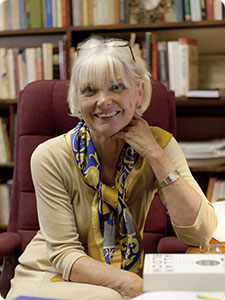Government Professor Yarbrough on the “Cancellation” of Thomas Jefferson
By Tom PorterIn the fall of 2021, a seven-foot statue of Thomas Jefferson was removed from the front of City Hall in New York City. One council member said the Founding Father’s likeness was taken down because Jefferson, who was a slave-owner, does not represent contemporary values.

Professor of Government Jean Yarbrough was not impressed. “This is such a cliché. I hear it all the time, that anything the left doesn't agree with doesn't represent ‘our values,’ ‘our democracy,’” said Yarbrough, who is Bowdoin’s Gary M. Pendy Sr. Professor of Social Sciences and a self-described political conservative.
“It's really, I think, a statement more of ignorance, because this person probably doesn't even know what Thomas Jefferson stands for, so how could he know whether he represented ‘our values’ or not.”
It is true that Jefferson, like most of his fellow Virginia gentry, was a slaveholder, she said, having inherited many slaves from his father-in-law, as well as a large amount of debt. But, added Yarbrough, it is also true that in 1769 he proposed a measure that would allow individual slaveholders to emancipate their slaves—a bill that was not enacted by the Virginia legislature.
Yarbrough was in conversation with author and political commentator Douglas Murray, as part of his online series “Uncancelled History,” which looks at events, people, and ideas that have been canceled from the past and reevaluates them through their historical context.
Watch the interview:



